amp SAAB 9-3 2004 Owners Manual
[x] Cancel search | Manufacturer: SAAB, Model Year: 2004, Model line: 9-3, Model: SAAB 9-3 2004Pages: 288, PDF Size: 23.54 MB
Page 9 of 288
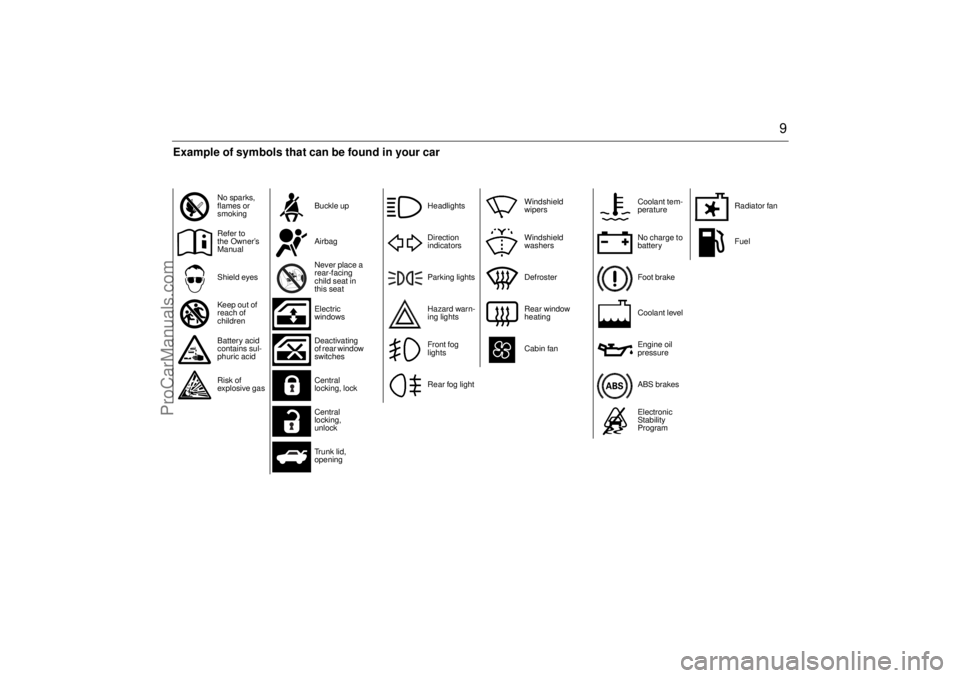
9
No sparks,
flames or
smokingBuckle up
Refer to
the Owner’s
ManualAirbag
Shield eyesNever place a
rear-facing
child seat in
this seat
Keep out of
reach of
childrenElectric
windows
Battery acid
contains sul-
phuric acidDeactivating
of rear window
switches
Risk of
explosive gasCentral
locking, lock
Central
locking,
unlock
Trunk lid,
opening
HeadlightsWindshield
wipers
Direction
indicatorsWindshield
washers
Parking lights Defroster
Hazard warn-
ing lightsRear window
heating
Front fog
lightsCabin fan
Rear fog light
Coolant tem-
peratureRadiator fan
No charge to
batteryFuel
Foot brake
Coolant level
Engine oil
pressure
ABS brakes
Electronic
Stability
Program
Example of symbols that can be found in your car
ProCarManuals.com
Page 18 of 288
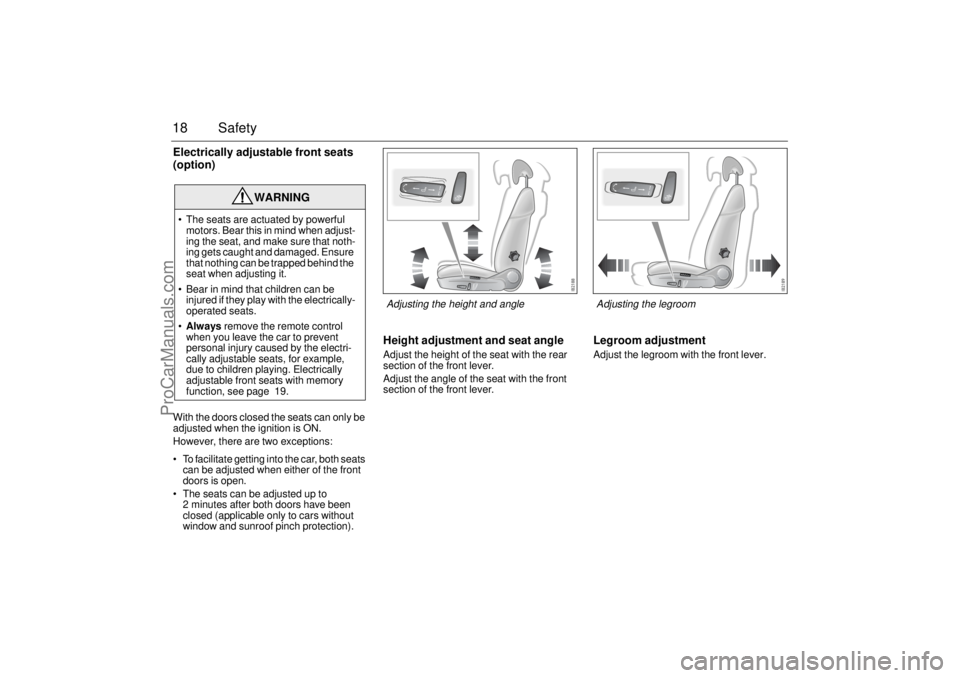
18 SafetyElectrically adjustable front seats
(option)With the doors closed the seats can only be
adjusted when the ignition is ON.
However, there are two exceptions:
To facilitate getting into the car, both seats
can be adjusted when either of the front
doors is open.
The seats can be adjusted up to
2 minutes after both doors have been
closed (applicable only to cars without
window and sunroof pinch protection).
Height adjustment and seat angleAdjust the height of the seat with the rear
section of the front lever.
Adjust the angle of the seat with the front
section of the front lever.
Legroom adjustmentAdjust the legroom with the front lever.
WARNING
The seats are actuated by powerful
motors. Bear this in mind when adjust-
ing the seat, and make sure that noth-
ing gets caught and damaged. Ensure
that nothing can be trapped behind the
seat when adjusting it.
Bear in mind that children can be
injured if they play with the electrically-
operated seats.
Always remove the remote control
when you leave the car to prevent
personal injury caused by the electri-
cally adjustable seats, for example,
due to children playing. Electrically
adjustable front seats with memory
function, see page 19.
Adjusting the height and angle Adjusting the legroom
ProCarManuals.com
Page 29 of 288
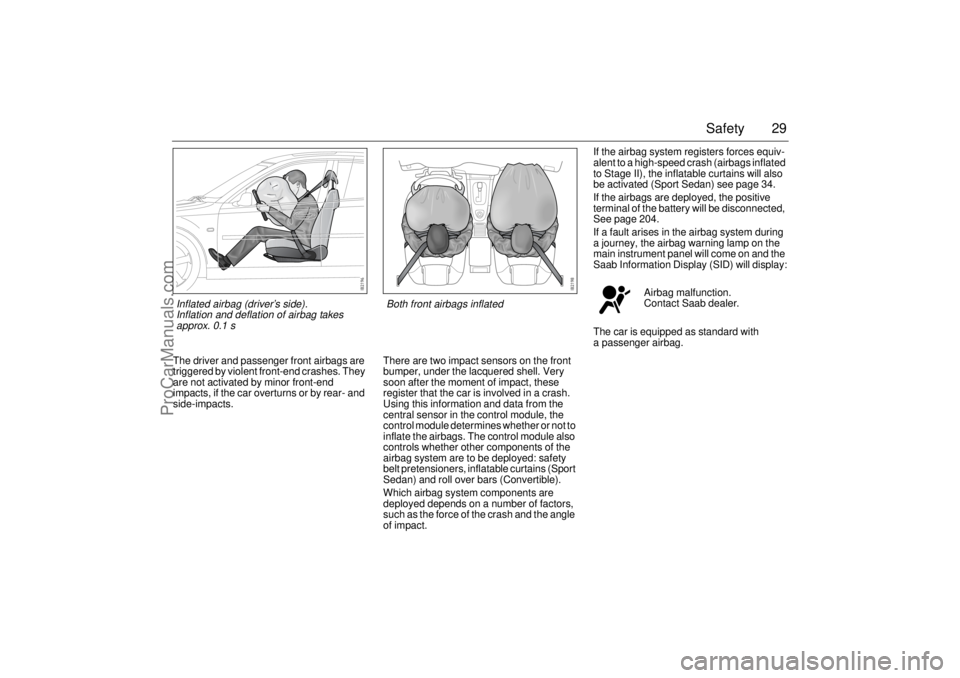
29 Safety
The driver and passenger front airbags are
triggered by violent front-end crashes. They
are not activated by minor front-end
impacts, if the car overturns or by rear- and
side-impacts.There are two impact sensors on the front
bumper, under the lacquered shell. Very
soon after the moment of impact, these
register that the car is involved in a crash.
Using this information and data from the
central sensor in the control module, the
control module determines whether or not to
inflate the airbags. The control module also
controls whether other components of the
airbag system are to be deployed: safety
belt pretensioners, inflatable curtains (Sport
Sedan) and roll over bars (Convertible).
Which airbag system components are
deployed depends on a number of factors,
such as the force of the crash and the angle
of impact.If the airbag system registers forces equiv-
alent to a high-speed crash (airbags inflated
to Stage II), the inflatable curtains will also
be activated (Sport Sedan) see page 34.
If the airbags are deployed, the positive
terminal of the battery will be disconnected,
See page 204.
If a fault arises in the airbag system during
a journey, the airbag warning lamp on the
main instrument panel will come on and the
Saab Information Display (SID) will display:
The car is equipped as standard with
a passenger airbag.Airbag malfunction.
Contact Saab dealer.
Both front airbags inflated
Inflated airbag (driver’s side).
Inflation and deflation of airbag takes
approx. 0.1 s
ProCarManuals.com
Page 35 of 288
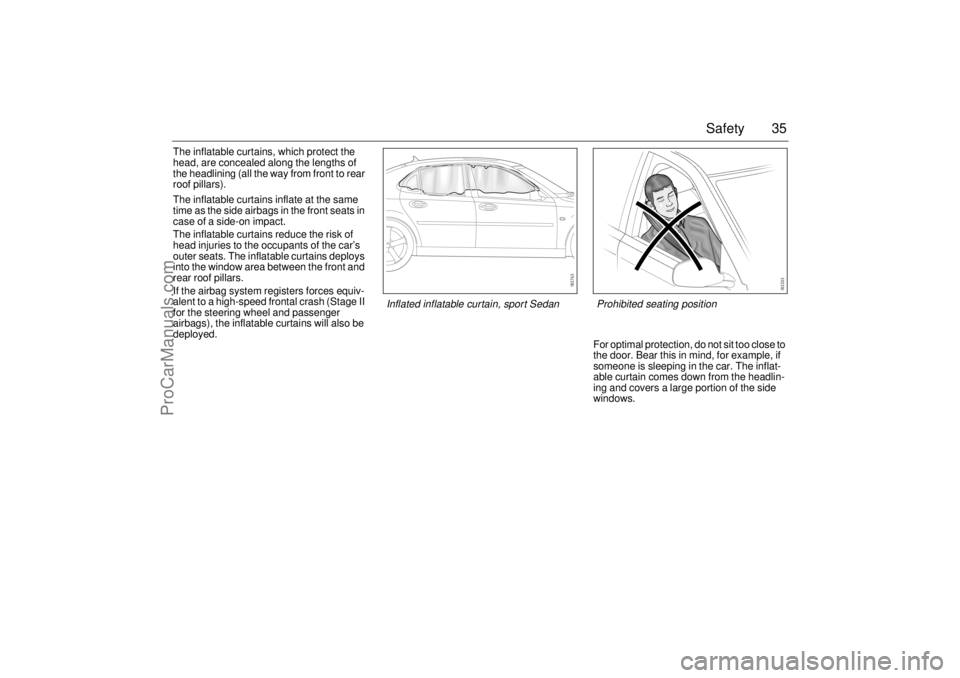
35 Safety
The inflatable curtains, which protect the
head, are concealed along the lengths of
the headlining (all the way from front to rear
roof pillars).
The inflatable curtains inflate at the same
time as the side airbags in the front seats in
case of a side-on impact.
The inflatable curtains reduce the risk of
head injuries to the occupants of the car’s
outer seats. The inflatable curtains deploys
into the window area between the front and
rear roof pillars.
If the airbag system registers forces equiv-
alent to a high-speed frontal crash (Stage II
for the steering wheel and passenger
airbags), the inflatable curtains will also be
deployed.
For optimal protection, do not sit too close to
the door. Bear this in mind, for example, if
someone is sleeping in the car. The inflat-
able curtain comes down from the headlin-
ing and covers a large portion of the side
windows.
Prohibited seating position
Inflated inflatable curtain, sport Sedan
ProCarManuals.com
Page 36 of 288
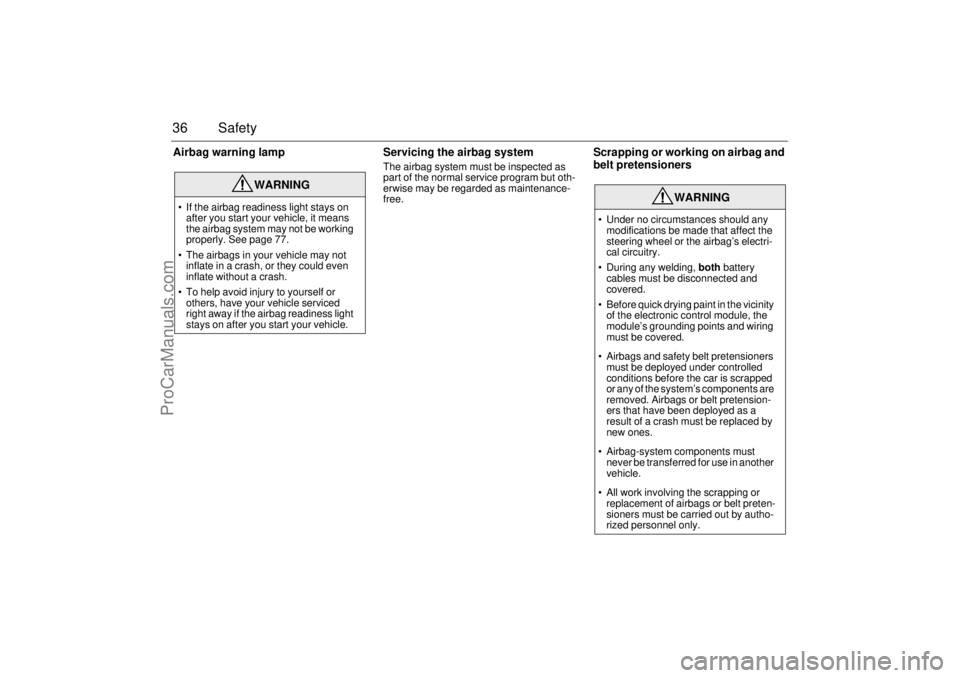
36 SafetyAirbag warning lamp Servicing the airbag system
The airbag system must be inspected as
part of the normal service program but oth-
erwise may be regarded as maintenance-
free.
Scrapping or working on airbag and
belt pretensioners
WARNING
If the airbag readiness light stays on
after you start your vehicle, it means
the airbag system may not be working
properly. See page 77.
The airbags in your vehicle may not
inflate in a crash, or they could even
inflate without a crash.
To help avoid injury to yourself or
others, have your vehicle serviced
right away if the airbag readiness light
stays on after you start your vehicle.
WARNING
Under no circumstances should any
modifications be made that affect the
steering wheel or the airbag’s electri-
cal circuitry.
During any welding, both battery
cables must be disconnected and
covered.
Before quick drying paint in the vicinity
of the electronic control module, the
module’s grounding points and wiring
must be covered.
Airbags and safety belt pretensioners
must be deployed under controlled
conditions before the car is scrapped
or any of the system’s components are
removed. Airbags or belt pretension-
ers that have been deployed as a
result of a crash must be replaced by
new ones.
Airbag-system components must
never be transferred for use in another
vehicle.
All work involving the scrapping or
replacement of airbags or belt preten-
sioners must be carried out by autho-
rized personnel only.
ProCarManuals.com
Page 45 of 288
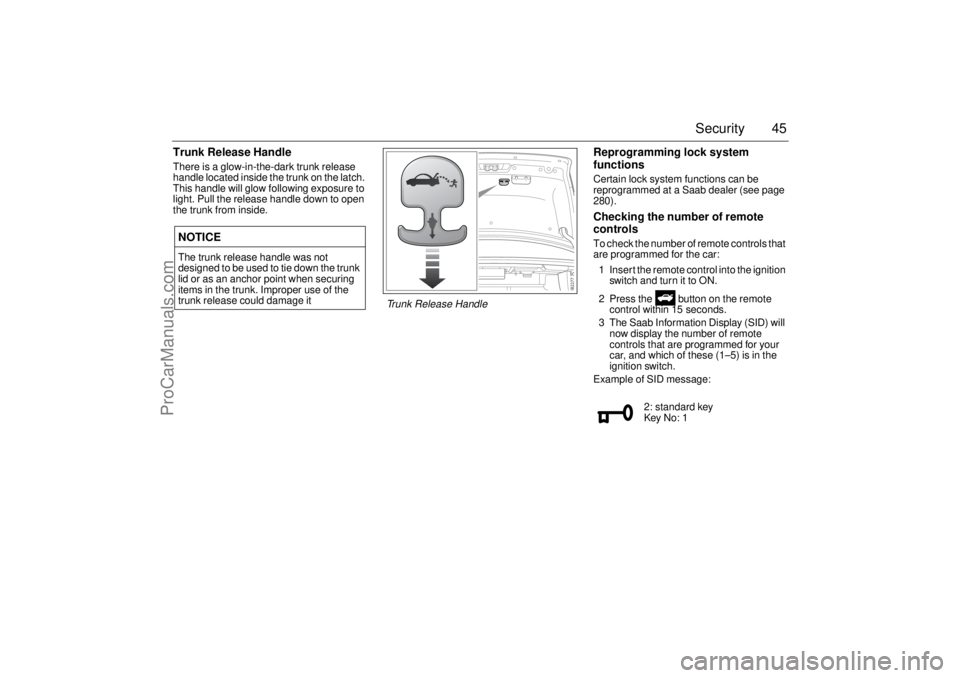
45 Security
Trunk Release HandleThere is a glow-in-the-dark trunk release
handle located inside the trunk on the latch.
This handle will glow following exposure to
light. Pull the release handle down to open
the trunk from inside.
Reprogramming lock system
functionsCertain lock system functions can be
reprogrammed at a Saab dealer (see page
280).Checking the number of remote
controlsTo check the number of remote controls that
are programmed for the car:
1 Insert the remote control into the ignition
switch and turn it to ON.
2 Press the button on the remote
control within 15 seconds.
3 The Saab Information Display (SID) will
now display the number of remote
controls that are programmed for your
car, and which of these (1–5) is in the
ignition switch.
Example of SID message:
NOTICEThe trunk release handle was not
designed to be used to tie down the trunk
lid or as an anchor point when securing
items in the trunk. Improper use of the
trunk release could damage it
2: standard key
Key No: 1
Trunk Release Handle
ProCarManuals.com
Page 50 of 288
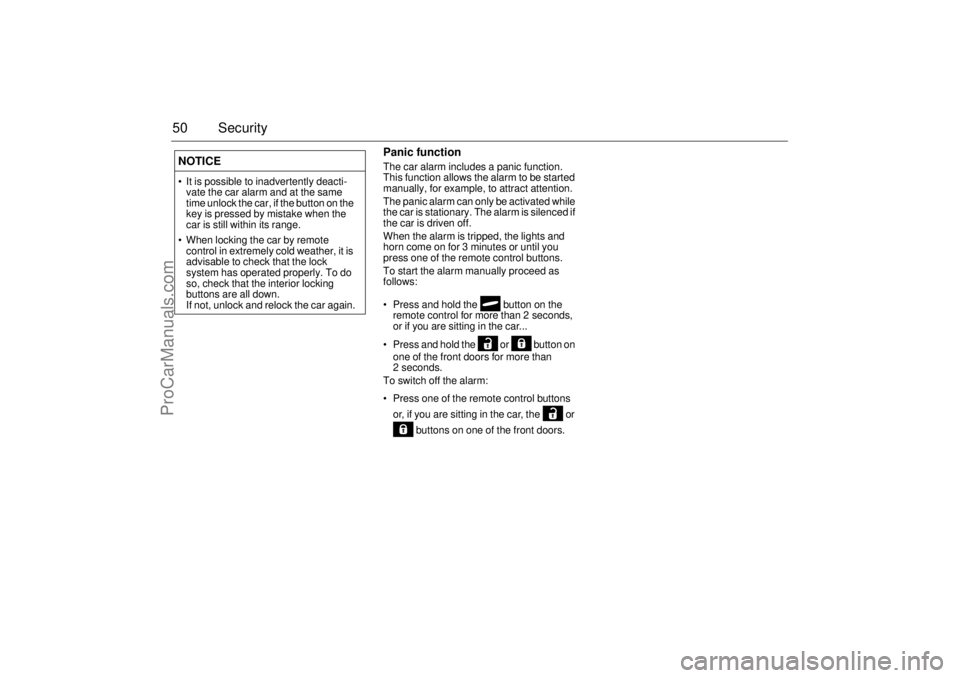
50 Security
Panic functionThe car alarm includes a panic function.
This function allows the alarm to be started
manually, for example, to attract attention.
The panic alarm can only be activated while
the car is stationary. The alarm is silenced if
the car is driven off.
When the alarm is tripped, the lights and
horn come on for 3 minutes or until you
press one of the remote control buttons.
To start the alarm manually proceed as
follows:
Press and hold the button on the
remote control for more than 2 seconds,
or if you are sitting in the car...
Press and hold the or button on
one of the front doors for more than
2 seconds.
To switch off the alarm:
Press one of the remote control buttons
or, if you are sitting in the car, the or
buttons on one of the front doors.
NOTICE It is possible to inadvertently deacti-
vate the car alarm and at the same
time unlock the car, if the button on the
key is pressed by mistake when the
car is still within its range.
When locking the car by remote
control in extremely cold weather, it is
advisable to check that the lock
system has operated properly. To do
so, check that the interior locking
buttons are all down.
If not, unlock and relock the car again.
ProCarManuals.com
Page 54 of 288

54 9-3 ConvertibleAdvice on soft top
operation• Once you have raised the soft top and
before driving off, always check that the
soft top is properly engaged with the wind-
shield rail.
Once you have folded the soft top and
before driving off, check that the soft top
cover is locked.
Do not operate the soft top in tempera-
tures below 23°F (–5°C).
Note that certain automatic car washes
can damage the soft top. This applies to
car washes that use mechanical feelers
bearing against the body. Saab advises
against washing the Convertible in an
automatic car wash.
After rain or washing the car, allow the soft
top to dry completely before folding it.
Folding a wet or damp soft top can cause
water damage in the car and mildew to
form on the soft top. Roof racks and ski holders must not be
mounted on the soft top.
On no account should anything be put into
the stowage space of the soft top (under
the soft top cover) since this could cause
an obstruction when the soft top is being
folded away.
Do not place any objects on the covers
over the roll bars as this can hamper their
function.
When operating the soft top, raise or fold
it fully until notified that operation is com-
plete by the SID. Do not leave the soft top
partially open/closed. If the soft top is left
in an intermediate position it will collapse
progressively after 20 seconds to prevent
overloading the drive system.
Washing the soft top, see page 250.
WARNING
Never touch the hinges and struts of
the soft top nor the upper rail of the
windshield while operating the soft
top.
Do not operate the soft top while there
are bystanders close to the car.
ProCarManuals.com
Page 69 of 288
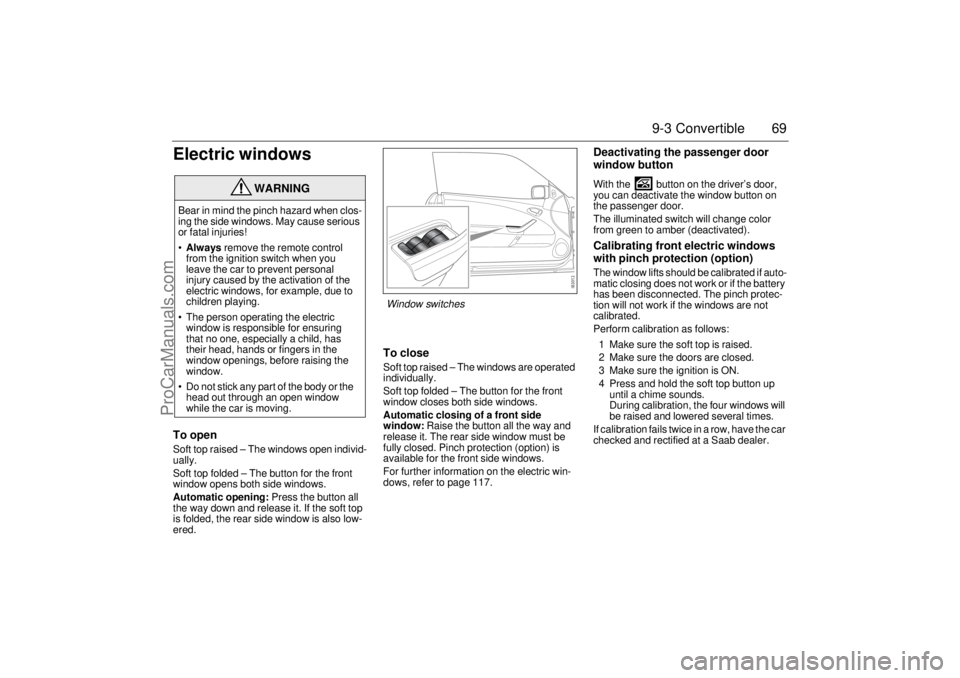
69 9-3 Convertible
Electric windowsTo openSoft top raised – The windows open individ-
ually.
Soft top folded – The button for the front
window opens both side windows.
Automatic opening: Press the button all
the way down and release it. If the soft top
is folded, the rear side window is also low-
ered.
To closeSoft top raised – The windows are operated
individually.
Soft top folded – The button for the front
window closes both side windows.
Automatic closing of a front side
window: Raise the button all the way and
release it. The rear side window must be
fully closed. Pinch protection (option) is
available for the front side windows.
For further information on the electric win-
dows, refer to page 117.
Deactivating the passenger door
window buttonWith the button on the driver’s door,
you can deactivate the window button on
the passenger door.
The illuminated switch will change color
from green to amber (deactivated).Calibrating front electric windows
with pinch protection (option)The window lifts should be calibrated if auto-
matic closing does not work or if the battery
has been disconnected. The pinch protec-
tion will not work if the windows are not
calibrated.
Perform calibration as follows:
1 Make sure the soft top is raised.
2 Make sure the doors are closed.
3 Make sure the ignition is ON.
4 Press and hold the soft top button up
until a chime sounds.
During calibration, the four windows will
be raised and lowered several times.
If calibration fails twice in a row, have the car
checked and rectified at a Saab dealer.
WARNING
Bear in mind the pinch hazard when clos-
ing the side windows. May cause serious
or fatal injuries!
Always remove the remote control
from the ignition switch when you
leave the car to prevent personal
injury caused by the activation of the
electric windows, for example, due to
children playing.
The person operating the electric
window is responsible for ensuring
that no one, especially a child, has
their head, hands or fingers in the
window openings, before raising the
window.
Do not stick any part of the body or the
head out through an open window
while the car is moving.
Window switches
ProCarManuals.com
Page 75 of 288

75 Instruments and controls
This light will come on if the engine oil pres-
sure is too low. If the warning light flashes or
comes on while you are driving, stop imme-
diately in a safe place, switch off the engine
and check the oil level (see page 196).
The following message is shown on the
Saab Information Display (SID):This light indicates a malfunction in the fuel
or ignition system. The car may still be
driven with care but the performance of the
engine will be somewhat diminished (see
page 144).
The following message is shown on the
Saab Information Display (SID):
Warning, oil pressure
(engine oil)
NOTICE
Never drive the car when the oil pressure
warning lamp is on. Low oil pressure can
cause serious engine damage.
Oil pressure low.
Make a safe stop.
Turn off engine.
Engine malfunction
(CHECK ENGINE)
WARNING
An illuminated “Engine malfunction
(CHECK ENGINE)” indicator light indi-
cates an engine-related problem. While
your car may be able to be driven with the
“Engine malfunction (CHECK ENGINE)”
indicator light illuminated (limp-home
mode), you are advised to have your car
serviced at an authorized Saab dealer as
soon as possible.
Continued driving without this problem
being corrected might cause serious
further damage to your car and create
unsafe driving conditions. The operator
should be prepared to take action if such
unsafe conditions arise (e.g. brake
smoothly, engage neutral, stop in a suita-
ble place, switch off the engine, etc.)
Engine malfunction.
Contact Saab dealer.
NOTICEThe car should be checked immediately
at a Saab dealer to prevent more serious
faults from arising.
ProCarManuals.com